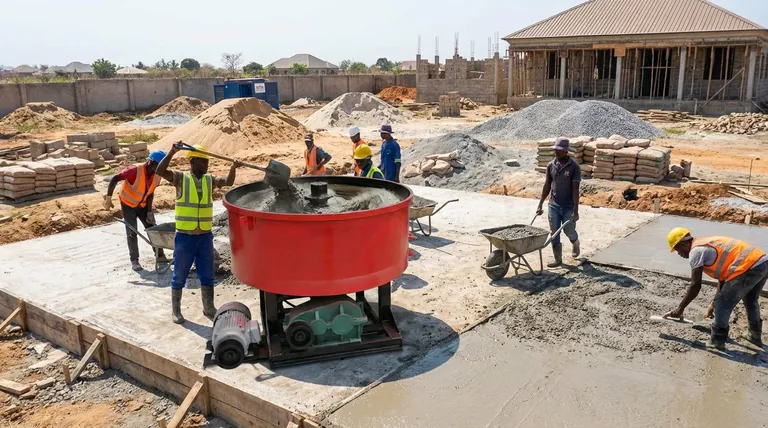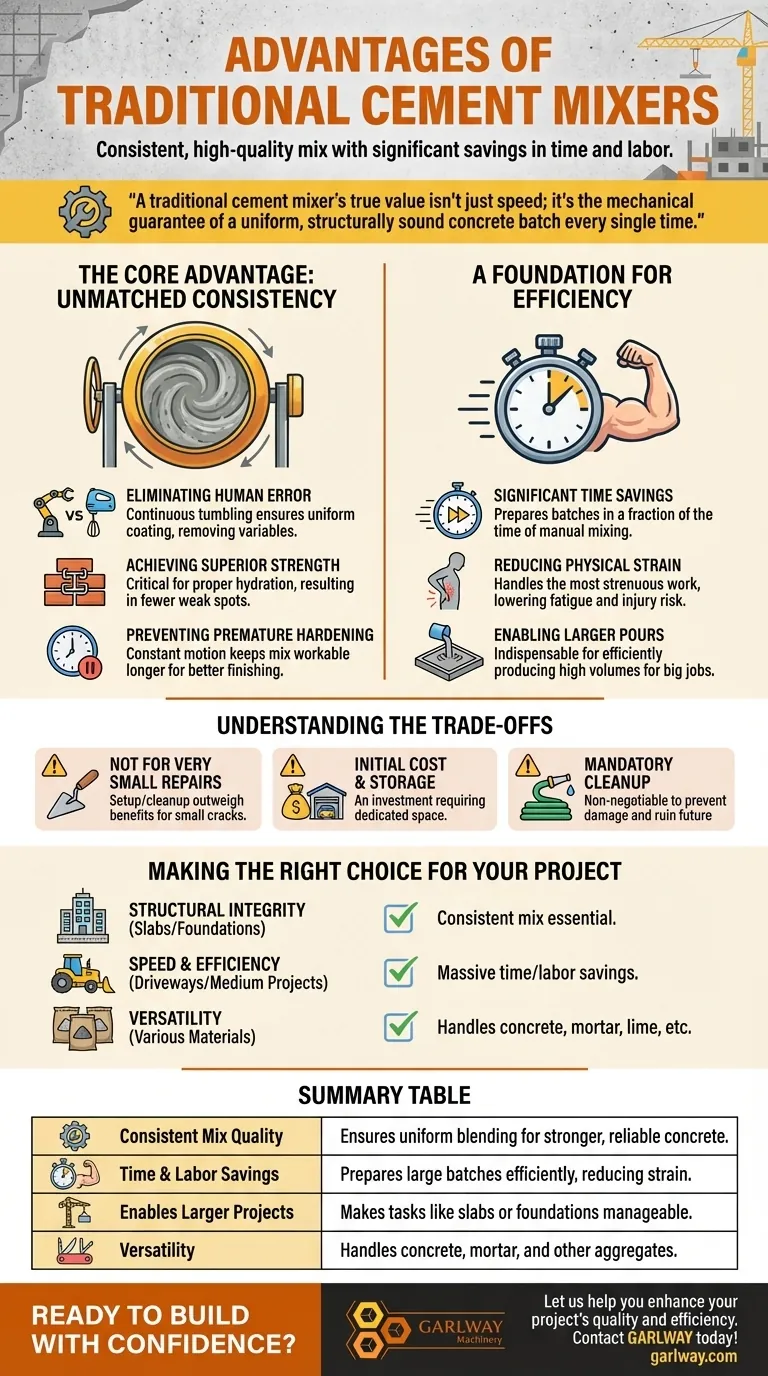The primary advantages of a traditional cement mixer are its ability to deliver a consistent, high-quality mix with significant savings in time and labor. For any small to medium-sized construction project, it ensures that materials like cement, sand, and gravel are blended thoroughly, resulting in stronger, more reliable concrete than what is typically achievable by hand.
A traditional cement mixer's true value isn't just speed; it's the mechanical guarantee of a uniform, structurally sound concrete batch every single time, which is the foundation of any durable construction work.

The Core Advantage: Unmatched Consistency
A mixer's greatest strength is its ability to eliminate the variables that plague manual mixing. The quality of your concrete should not be left to chance.
Eliminating Human Error
Hand-mixing is prone to inconsistencies. A mechanical mixer uses a continuous tumbling action that ensures every particle of sand and gravel is evenly coated with cement paste, batch after batch.
Achieving Superior Strength
This uniform coating is critical for proper hydration and bonding within the concrete. The result is a final product with fewer weak spots and significantly higher compressive strength.
Preventing Premature Hardening
The constant motion of the drum keeps the concrete mix workable for longer. This prevents it from hardening too quickly, giving you more time to pour and finish the job correctly.
A Foundation for Efficiency
Beyond quality, a cement mixer fundamentally changes the workflow of a project, making larger tasks manageable and less physically demanding.
Significant Time Savings
A mixer can prepare a batch of concrete in a fraction of the time it would take to mix the same volume by hand in a wheelbarrow. This efficiency is essential for projects where productivity is key.
Reducing Physical Strain
Manually mixing concrete is grueling work. A mixer handles the most strenuous part of the process, reducing fatigue and the risk of injury for you or your crew.
Enabling Larger Pours
For jobs like pouring a small slab, sidewalk, or foundation, a mixer is indispensable. It allows you to produce the necessary high volume of concrete efficiently, which would be impractical by hand.
Understanding the Trade-offs
While highly effective, a traditional mixer is not the perfect solution for every single task. Objectivity requires acknowledging its limitations.
Not for Very Small Repairs
For setting a single fence post or patching a tiny crack, the setup and cleanup time for a mixer can outweigh the benefits. In these cases, mixing a small bag in a wheelbarrow is often faster.
Initial Cost and Storage
A cement mixer is an investment. It also requires adequate space for storage when not in use, which can be a consideration for smaller workshops or garages.
Mandatory Cleanup
Proper cleaning is non-negotiable. Hardened concrete left inside the drum can damage the machine and ruin future batches, so you must factor in the time to wash it out thoroughly after every use.
Making the Right Choice for Your Project
Choosing the right tool comes down to matching its capabilities with the demands of your specific goal.
- If your primary focus is structural integrity for slabs or foundations: The consistent, high-quality mix from a machine is essential for long-term durability.
- If your primary focus is speed on a medium-sized project like a driveway: The massive time and labor savings make a mixer the only practical choice.
- If your primary focus is versatility for various materials: A mixer handles concrete, mortar, lime, and other aggregates, making it a valuable tool for multiple types of projects.
Ultimately, investing in a cement mixer is an investment in the quality and longevity of your work.
Summary Table:
| Advantage | Key Benefit |
|---|---|
| Consistent Mix Quality | Ensures uniform blending for stronger, more reliable concrete. |
| Time & Labor Savings | Prepares large batches efficiently, reducing physical strain. |
| Enables Larger Projects | Makes tasks like pouring slabs or foundations manageable. |
| Versatility | Handles concrete, mortar, and other aggregates effectively. |
Ready to build with confidence?
Investing in the right equipment is the foundation of a successful project. GARLWAY specializes in durable and efficient construction machinery, including concrete mixers designed for contractors and construction companies who demand reliability and performance.
Let us help you enhance your project's quality and efficiency. Contact GARLWAY today to find the perfect mixer for your needs!
Visual Guide

Related Products
- Hydraulic Concrete Mixer Machine Cement Mixing Equipment for Mixture Concrete
- Portable Concrete Mixer Machine Equipment for Mixing Concrete
- JW1000 Mobile Cement Mixer Concrete Mixer Truck and Batching Plant
- HZS75 Concrete Batching Plant Cement Mixer Price Concrete Mixer Bunnings Mixing Plant
- HZS180 Ready Mix Concrete Plant for Foundations with Sand and Cement
People Also Ask
- Why is the type of concrete mix important when choosing a mixer? Ensure Strength & Workability
- What are the characteristics of front-loading concrete mixers? Master On-Site Concrete Production
- What is the proper sequence for loading materials into a cement mixer? Ensure Strong, Durable Concrete
- What cost-saving advantages does a mobile concrete mixer offer? Slash Your Project Expenses
- How do concrete mixer trucks maintain concrete quality during transport? Ensure Homogeneous, Workable Concrete
- Why do cement trucks rotate their drums? To Prevent Costly Concrete Hardening
- What are key applications of industrial mixers in the oil and gas industry? From Drilling to Refining
- What maintenance is required after a new concrete mixer has been used for one day? The Essential First-Day Break-In Guide



















